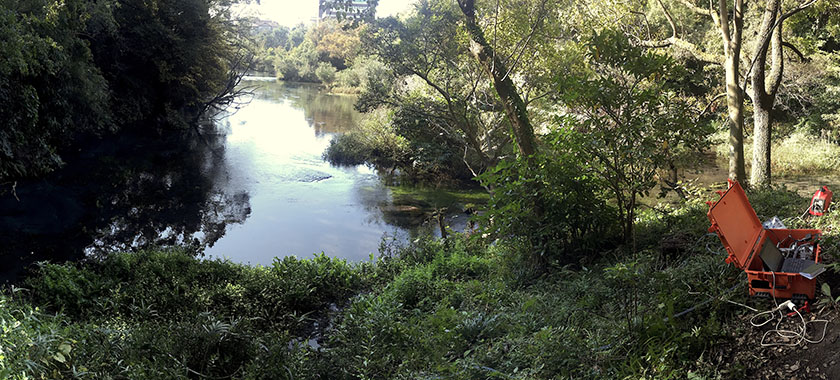Department Water Resources and Drinking Water
Tracer Hydrogeology
In the Tracer Hydrogeology Group, we aim to improve the conceptual and quantitative understanding of groundwater processes and groundwater-surface water interactions in diverse environments via novel tracer techniques. For this we build on two fundamental pillars of modern hydrogeology: (a) on diverse observations of hydrological and biogeochemical fluxes and processes, and (b) on integrated surface-subsurface hydrological models (ISSHM). On the one hand, integrating diverse observations that represent different spatial and temporal scales is necessary to characterize the highly dynamic and complex behavior of hydrological and biogeochemical processes in the subsurface, on the surface, in the atmosphere and in the biosphere. On the other hand, numerical models able to simulate all relevant fluxes and processes throughout both the surface and the subsurface in a physically based manner are necessary to quantify and predict the current and future behavior of hydrogeological systems. To take full advantage of both domains in the advancement of our understanding of hydrological and biogeochemical processes in surface water-groundwater systems, we integrate both components via state-of-the-art model calibration and data assimilation algorithms. Ultimately, the goal of our research is to provide efficient and affordable means for safe and sustainable drinking water production from groundwater, and to sustainably manage our precious freshwater resources addressing both societal and ecosystem needs.
We currently focus our research efforts on developing and employing novel analytical techniques for on-site and continuous observation of hydrogeological fluxes and processes. Techniques that we currently employ include gas equilibrium-membrane inlet portable mass spectrometry to measured dissolved gases in groundwater and surface water, eDNA and online flow cytometry to observe the size and composition of microbial communities in the subsurface and in streams, and laboratory based analyses of natural (radioactive) tracers such as stable water isotopes, tritium, radon-222 or argon-37.
Together with the Hydrogeology Research Group and the Applied & Environmental Geology Group of the Department of Environmental Sciences at the University of Basel, the Tracer Hydrogeology Research Group of W+T at Eawag in Dübendorf form the joint Hydrogeology Professorship of University of Basel and Eawag.
The Tracer Hydrogeology Research Group is active member of the Water Earth Systems (WES) PhD school and the Swiss Groundwater Network CH-GNET.

Location
Universität Basel
Departement Umweltwissenschaften
Hydrogeologie
Bernoullistr. 30/32
CH-4056 Basel, Schweiz
Tel: +41 61 207 0478
News
Key Publications
- https://www.nature.com/articles/s44221-022-00001-4
- https://www.frontiersin.org/articles/10.3389/frwa.2022.980030/full
- https://agupubs.onlinelibrary.wiley.com/doi/10.1029/2022GL098944
- https://agupubs.onlinelibrary.wiley.com/doi/full/10.1029/2020WR028479
- https://agupubs.onlinelibrary.wiley.com/doi/full/10.1029/2018RG000619




